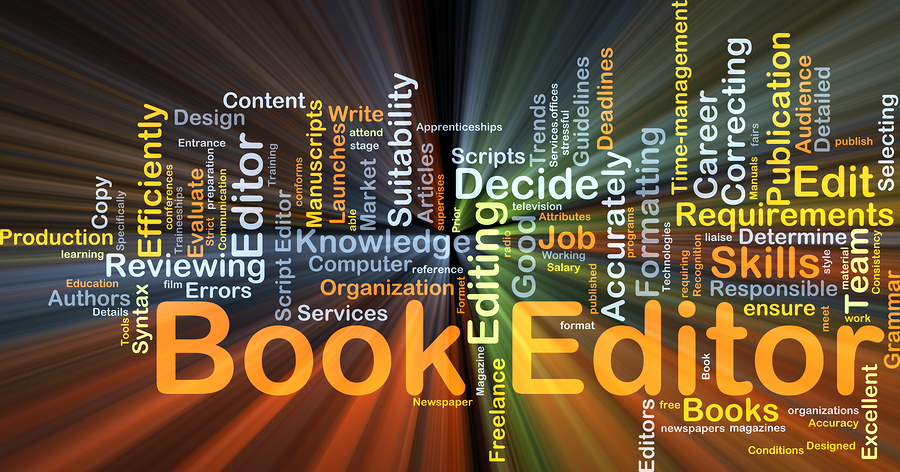As we saw from the comments last week, editors have many tasks. As do copyeditors and proofreaders, but for the next few blogs we’re focusing on editors.
I’ve been an editor for over 35 years, both in-house and freelance. And I’ve worked with all categories of books except Children’s books and academic titles. So here, from that perspective, is my take on what editors do.
First, let’s look at what editors need to keep in mind before they ever pick up a red pen (or turn on Track Changes).
Editors must keep their employer in mind
If you’ve hired a freelance editor, that employer is you. If they work for the publishing house that’s putting your book out, they work for the house and for you. That means as they work, they keep in mind your (and the publisher’s) needs and expectations, and work to meet or exceed them.
Editors serve the writer
I’ll never forget, when I was working for one publishing house, the day a fairly new editor came into my office spouting off that the writer whose book he was working on had no clue what he was doing. His rant finished with, “I could write a better book than this any day!”
I leaned my elbows on my desk and looked at him. “Then why don’t you?”
He stopped. “What?”
“If you can write a better book, then why don’t you?”
The list of “reasons” came fast and furious—he had a full-time job, no place at home to write, no one was publishing what he wanted to write, and so on. I just shook my head.
“That author you’ve been yelling about also has a full-time job. And he faces all the other issues you brought up. And yet he did what you haven’t. He wrote a book. So until you’ve done the same, until you’ve put in the time and sweat and tears, and stayed up into the wee hours of the morning pounding away at the keyboard, and gone to work after pulling an all-nighter and done all the things every writer has to do to get their job done, I suggest you focus on doing your job, which taking what that person wrote and helping him to make it even stronger.”
Being an editor isn’t about arrogance, it’s about respecting the writer and serving him by applying editorial skills and knowledge to help that writer produce the very best book he or she can.
Editors act as a bridge between writer and reader
The editor evaluates the book, answering the question: Does it work? Will readers resonate to this book? Will the book accomplish what the author intends and hopes? If so, then how can it work better? And if not, then what are the big-picture (flow, voice, vocabulary, plot, pacing, character development, and on and on), and smaller-picture issues holding it back. Every single author I’ve worked with, whether a newbie or a best-seller, has something that they need to work on. Shoot, I have things I need to work on as a writer. Which is why I love my editor so much.
Editors suggest solutions in whatever way works best for the author
Editing is a lot of things, but it is not a one-size-fits-all endeavor. Finding the issues in a book is just the first step. From there the editor needs to make suggestions on how the issues can be fixed. And they need to do this in a way that works for the author.
One of the first books I ever edited was written by two doctors. I don’t recall the topic, but it was supposed to be “popular nonfiction,” bringing somewhat highbrow ideas to the “everyman.” When I started the edit, one of the first sentences declared that “people who promote and promulgate these pernicious and perfidious denigrations are to be eschewed.” And the rest of the book went on to use similar vocabulary (and redundancies).
I sent the authors the first edited chapter, and they were upset. I didn’t have the degrees or medical experience and knowledge. Why was I telling them to change things? “Because,” I told them, “I’m your ‘everyman’ audience.” We talked about their goal of sharing lofty ideas so that anyone could grasp them, which meant using “everyman” vocabulary. And I reminded them that even as I needed to respect them and what they were writing, they needed to respect their audience and share these ideas in ways that wouldn’t have them scrambling for the dictionary every other word. As we talked, I discovered they both were pretty funny guys, once you got past the verbosity. So I encouraged them to use that touch of humor in the book as well. Happily, the authors did a great job on the revision, and by the time we were done, we had a book that not only communicated to, but also entertained, the readers.
Editors encourage the writer
Considering how much criticism and negativity writers have to endure, I decided long ago to make sure I tell the writers I work with when they do something right. I celebrate lines that are well crafted, and characters I come to love. I let my “reader” reactions come out during the edit, writing notes and comments to give a well deserved, “Great job!”
Editors caution the writer
Writers learn and grow and try new things. That’s great—until it’s not. As an editor, it’s my responsibility to sound the alert when something just doesn’t work. I haven’t had to do it often, but I have done it. Sometimes it’s a caution about the tone of a book, or even that the message that’s coming across may not be what the author intends. Or it can be that the author has tried a different voice, and it really doesn’t fit. Robin Jones Gunn, a truly gifted writer, tells the story of the time I was her editor and had to contact her and say the book she’d turned in wasn’t acceptable. The craft was there—how could it not be with Robin?–but the tone and voice were just…wrong. That was one of the most difficult things I’ve ever had to do, because I LOVE Robin and her writing. And it was a hard thing for her to hear and experience. But she did the work, completely rewriting the book, and the final product was amazing. And award-winning.
So those are some of the things editors have to keep in mind as they come to an editing job. The week after next (because next week is a fun St. Patrick’s writing game), we’ll get into the actual nuts and bolts of what is involved in an edit.



 The Friendly Social-Media Purge
The Friendly Social-Media Purge

Thank you so much for this insight. Your approach to editing has eased my fears for when I reach this point with my MS. I can’t wait to read your next posting.
I have to say, Karen, your words removed some of the fear that I’ve had about pursuing an agent again, or even attempting the traditional publishing route again. Working with an editor either from the agency or the publisher, as opposed to a freelance editor, gave me pause. I’m still not sure that’s where I want to go, but I’ll feel better about the decision (if I feel God’s leading). Thank you!
What a great post.
I love that you used the word respect. If we respect the editor and the editor respects us, it sounds like the process will be much smoother.
I’m looking forward to Phase 2.
Have a great day!
Your insights are important and appreciated. Thank you.
Great post, Karen! I’ve been blessed with helpful, encouraging editors, and have always been grateful. New writers, especially, need to put ego aside and listen to suggestions. I was surprised at the beginning how much better my work was after edits. 🙂
I took courage when I read this: … “one of the first sentences declared that ‘people who promote and promulgate these pernicious and perfidious denigrations are to be eschewed.”’
If an author can write a sentence like that and then submit a manuscript that commands an editor’s attention, then there’s hope for me. 🙂
I’m so thankful for this post. I just recently hired my first freelance editor to edit my first book, so this post was right in time. This post has helped me understand her position better, and even though I employ her I want to make sure I understand her role.I’m looking forward to the next one.
Right on, Karen!
Thank you Karen, for the lesson. A mini look inside the world of an editor.
L.S. McKain
Karen,
What wise words! A publisher’s rep who didn’t know me from Eve and had never read anything I had written once suggested that I hire an editor for my book before I submitted a proposal to her. I retorted defensively, “But I AM an editor!” I’m blessed with having other writers and editor friends who are willing to do critical reviews for me before I submit proposals, but I hadn’t thought of them as my editors.
You’ve clarified why even editors benefit from having editors! Thanks! 🙂
Karen, I’m glad you’re doing this series. As usual, I’m learning useful things from you.
I find your story about the non-author editor intriguing. In general, do you think it is a better idea to use an editor who also writes novels? Is it an even better idea to find an editor who has actually published with a traditional house?
Thanks for guiding us all along the confusing paths to publication.
A very good piece, Karen. Keep up the good work.
“Being an editor isn’t about arrogance, it’s about respecting the writer and serving him by applying editorial skills and knowledge to help that writer produce the very best book he or she can.”
This is a wonderful statement from someone who is committed to her work. Keep on being an encourager!
Thanks Karen! This is truly an encouraging piece.
I have been writing but never had the boldness to send out anything for fear of being ripped to shreds by an editor.
After reading this, I will take the jump.